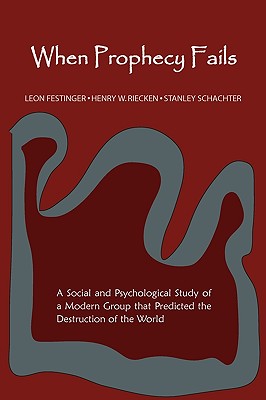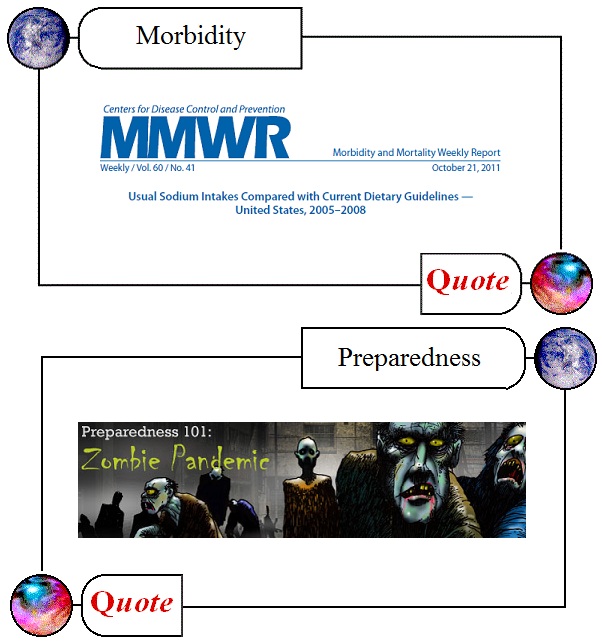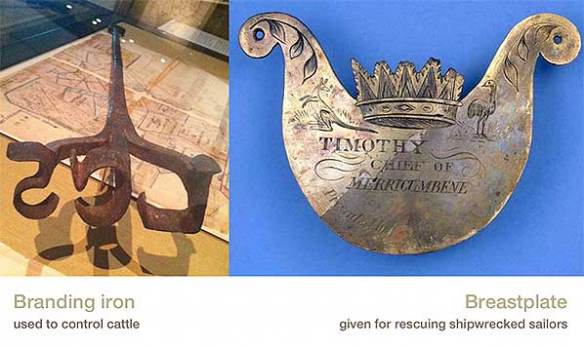To what End?
Friday, November 11th, 2011[ by Charles Cameron — prophecy, millennial date-setting, when prophecy fails, scenario planning, hubris ]
.
To what End, prophecy and prediction?
Stephen O’Leary was right in his guess that Harold Camping would “recalculate” if and when (emphasis on the “when”) his May 22 prediction for the end of the world earlier this year failed. Camping did indeed recalculate, and his new prediction, for October 21, similarly passed without trumpets of the sort to be expected. This time, Camping apologized, admitting:
when it comes to trying to recognize the truth of prophecy, we’re finding that it is very very difficult.
He also said, with respect to his own failed prophecies:
God has done to us similarly to what he did to a couple of other great men of faith, one being Abraham…
First, the point I want to make. Then, more from Harold Camping, for those who are interested in the great question that’s raised When Prophecy Fails…
1.
Here’s what I want to explore. Stephen O’Leary writes:
One thing that apocalyptic predictions throughout history have in common is that, without exception, they have all been proven wrong.
Stephen is an old friend of mine, and the author of the classic work Arguing the Apocalypse: a theory of Millennial Rhetoric (Oxford, 1994), and in the quote above he’s writing on May 19th in the Wall Street Journal’s “Speakeasy” blog.
What Stephen is saying here is something of a commonplace among millennial scholars, and his colleague Richard Landes, with whom he founded the Center for Millennial Studies, also a friend, picks up on it at the very end of his magisterial (I’ve used that term for this book before, and will again) Heaven on Earth: The Varieties of the Millennial Experience (Oxford, 2011), when he writes:
Whereas the rule, “apocalyptic prophecies are always wrong” holds, it does not hold about the future, especially a future in which humankind has the ability to self-destruct or, short of that, inflict cataclysmic damage on itself and the miraculous and crowded planet on which we live.
Religious predictions of the Coming One have (thus far) all failed, in other words, but scenarios of an End based on human behavior in aggregate may yet prove out.
Which then raises another question:
What is the relation of prophecy to scientifically informed prediction? Are religious predictors of apocalypse perhaps intuiting what some scenario planners are also anticipating – and thought to be foolish only because they express it in religious language, their native tongue?
Are they merely noting that Pride comes before (as well, perhaps, as after) a Fall?
2.
For those who may be interested, here’s more from the tail end of Camping’s statement [Family Radio: “Messages from Mr. Camping” 11/8/2011]:
We were ready to say, “Good bye to them. It’s all over. It’s all over. It’s time for the end.”
And now at the last moment, God has come and said, “No, no, it’s not the end. I still have some other plans.”
So what do we do? What do we do? Do we argue with God: “Wait a minute God. You said it so plainly. We were so convinced. There were so many proofs of the Bible, that it cannot have been that we were incorrect — maybe in a tiny detail here or there, but no God, we’re sure that it had to happen.”
But it didn’t happen. And we know that God brought it right to the very edge, right to the very day and past the day that the, there should have been judgment seen all over the world.
So, the first question I have to ask all of us — I have to ask myself this very, very carefully — Are we ready see that we did not understand God’s plan altogether? Are we ready to stand back and wait and do some more studying and recognize that maybe God is not finished with bringing salvation to the world.
As a matter of fact, we know that only about a third of the world had ever heard of the Bible before five months ago. Now by God’s mercy through the actions of Family Radio, as stupid as some may think they may have been, as incorrect as some may think they may have been, yet they all fit into a part of a plan where now the whole world has heard about the Bible. They’ve heard about the God of the Bible. God now is ready for the next action based on that kind of information, what will that be?
And that is where we have to start our thinking. We have to begin to think it out, “How does all of that impact our future teaching of the Bible?” And so, in our next study, we’re going to begin to examine that. Thank you very much.
3.
And so the wheel turns, the road goes ever on.
Does it?







